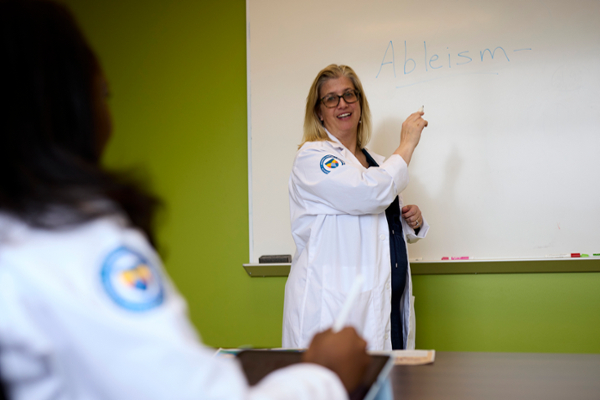Rowan-Virtua Regional Integrated Special Needs Center offers transformative, accessible health care and education
Rowan-Virtua Regional Integrated Special Needs Center offers transformative, accessible health care and education

The Centers for Disease Control and Prevention (CDC) estimates that 61 million people in the U.S., or one in four adults, have some form of disability. People with disabilities, whether physical, intellectual, or developmental, often face obstacles when trying to access health care. These challenges include a lack of accessibility at health care facilities for individuals who use wheelchairs or healthcare providers not allotting enough time for patients who have communication difficulties or rely on technology.
Rowan-Virtua Regional Integrated Special Needs (RISN) Center is leading the effort to improve access to health care for people with disabilities. A primary care practice within Rowan Medicine, RISN aims to improve access to wellness and routine preventative healthcare through patient-centered care coordination and integrated behavioral health services.
“Our goal is healthcare access for all, and all means all. We cannot allow ableism to be so pervasive in our health care system,” says Jennifer LeComte, D.O., the founding medical director of RISN. “We cannot deny care to someone because they require more time to express their needs or utilize different equipment to obtain basic vital signs or because we, the health care team, need to learn more about their unique needs."
Building bridges in care
RISN serves patients who are transitioning from pediatric to adult care and have intellectual, developmental and physical disabilities or chronic conditions from childhood. Through that experience, the staff at RISN are uniquely positioned to address a knowledge gap within the health care community by offering training that future health care professionals need to provide culturally competent, compassionate care to patients with disabilities.
“If we needed a special doctor for everyone with a disability, no one would get care," LeComte explained. “All doctors should have some training in treating this marginalized patient population.”
To that end, RISN has developed a three-year community service learning and leadership curriculum that immerses medical students from the Rowan-Virtua School of Osteopathic Medicine (SOM) in essential topics such as etiquette when caring for people with different abilities and combating ableism in health care.
Tools for compassionate care
RISN physicians collaborate with students and residents to create resources that health care professionals can use to provide inclusive care to individuals with developmental and intellectual disabilities. One such tool is the CARES Manual, which includes flyers for reproductive wellness that primary care doctors can display in their offices. These flyers encourage patients to advocate for themselves and seek accommodations while reminding providers to offer them. For instance, one flyer emphasizes that anyone with a cervix needs a pap smear, regardless of their gender identity. This way, health care providers are encouraged to prioritize their patient's anatomy over their identity and provide preventative care to all who need it.
“These are really simple tools. If you have these hanging up in your office, you’d feel like, as a patient, you could ask about that care if your provider didn't ask you about it. We develop these tools to show other providers they can do it too,” LeComte said.
In addition to the community service learning and leadership curriculum, interested SOM students can participate in a two-week elective, volunteer work, or research with RISN. During this program, students get to spend time with each discipline embedded in the practice, including a primary care doctor, a social worker, a clinical psychologist, a psychiatric nurse practitioner and a pediatrician. Students typically spend a half day shadowing the practitioner to get direct clinical experience with patients. Additionally, students go out once or twice during their rotation to a community partner site, such as the Special Olympics or Bankbridge School System. RISN tries to align each student's rotation experience with their future specialty choice.
June Solow, D.O., a 2024 SOM graduate, completed an elective with RISN as one of the first rotations of her fourth year of medical school. “Caring for the special needs population is a chance to practice your creativity, listening, and open-mindedness, which are all equally important in caring for the general population,” Solow said. “It was revolutionary for my understanding of the disability community and how to adapt my medical care for unique cases.”